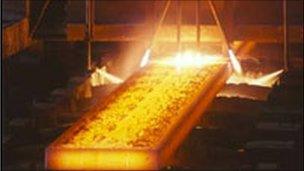India gives final okay to $12bn Posco steel plant
- Published

India's demand for steel is growing along with the economy
India's environment ministry has given final clearance to South Korean company Posco's plan to build a steel plant in the eastern state of Orissa.
Environment Minister Jairam Ramesh gave the state permission to divert 3,100 acres of forest to the $12bn plant.
The plant has faced stiff opposition from the local people, campaigning to save farmland and forests.
A government panel had earlier said the plant's environmental clearances should be scrapped.
But it was given conditional approval in January. The environment ministry had spelt out 28 "extra conditions" for the steel plant and 32 conditions for the port.
Critics say the project will exhaust iron deposits in 20 years.
Mr Ramesh said the approval was conditional on Posco regenerating an equal area of forest in an area decided by Orissa state, as well as paying for the land.
The plant had "considerable economic, technological and strategic significance," news agency AFP quoted the minister as saying.
"At the same time, laws on the environment and forests must be implemented seriously," he added.
Orissa Chief Minister Naveen Patnaik said "appropriate action" would be taken on the project after receiving the environment ministry order.
Officials at Posco have welcomed the order, while those opposed to the plant have described the government's order as "deeply unfortunate".
The conditions set by the government in January included the company spending a share of profits on corporate social responsibility, ensuring green cover at the plant site, and restrictions on construction of the port in sensitive coastal areas.
The project was conceived in 2005 and is India's single biggest foreign investment.
Based in the port city of Paradip, it is expected to create nearly 50,000 jobs.
But it has been opposed by many groups who argue that Posco will exhaust Orissa's iron ore resources in two decades while creating lasting environmental damage.
Following protests, the environment ministry set up a panel to investigate if Posco's project had been complying with the country's green law, including rehabilitating and resettling local people displaced by it.
Three of the panel's four members recommended that environmental clearances for the project be cancelled, saying there were flaws in the manner in which it was being implemented.
- Published10 December 2010
- Published31 January 2011
- Published19 October 2010